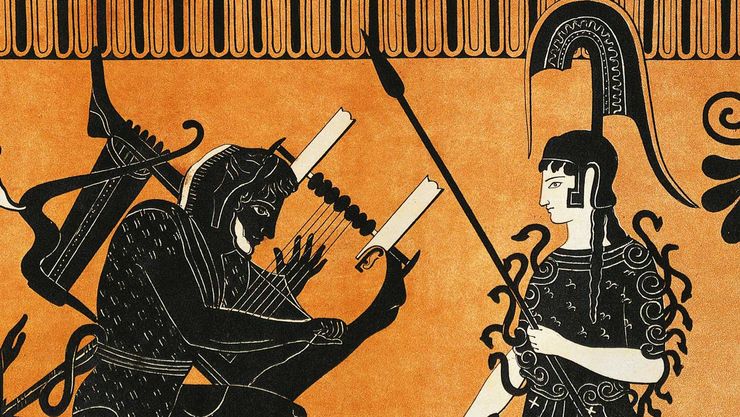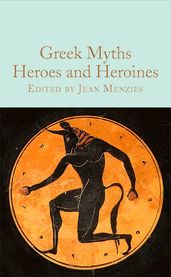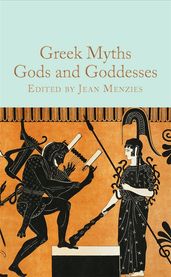'Myth' doesn’t mean made up: five things you need to know about the Greeks
Classicist Jean Menzies on her Greek mythology essentials.

Whether you’ve recently picked up a collection of myths to peruse, are a diehard fan of Greek retellings like Stone Blind or The Song of Achilles, or you simply found yourself googling ‘Greek mythology’ in the hope of learning more, there are a few things concerning this topic that Jean Menzies – classicist, author, and editor of two new collections of Greek myths and retellings – believes everyone should know.
Myth does not mean falsehood
First and foremost, it’s time to deconstruct any existing ideas you have about what the words ‘myth’ and ‘mythology’ actually mean. Mythology is an entirely modern (or medieval) word first coined by the monk John Lydgate in his fifteenth-century poem Troy Book through the combination of the Greek logos, meaning word, and mythos, meaning story. Yes, that’s right, the origin of our term myth comes from a Greek word that simply meant story. A concept that in itself does not equal fictitious. Rather, what we now refer to as Greek mythology are the stories of important figures in ancient Greek religion and, often, history. While the actual historical accuracy of individual stories is and was up for debate, even among the ancients themselves, the fact is, the deities and heroes they followed were of huge cultural significance both in how the Greeks understood themselves and the world around them.
There is no one ‘true’ version of a myth
If you think modern writers and artists enjoy retelling Greek mythology, then just wait until you hear about the ancient Greeks themselves. Not only are there countless unique narratives within the surviving written material, but there are also numerous examples of different authors framing existing myths in new ways. And there are reasons for this! One is related to geography. Ancient Greece was not a homogenous society, it was made up of various city-states, which although they shared a language, had distinct cultural identities. Athens for example might attribute deeds to their mythical king Theseus that other states credited to the hero Heracles. The same thing is true of local cult variations – these are religious stories after all. Secondly, the period we term antiquity did not just exist in a state of stasis for hundreds of years. Things changed. Myths were reinterpreted and retold according to contemporary values whether for political or personal reasons. That doesn’t mean there weren’t consistencies or roots to these stories, or that we can reasonably imagine any version of a myth we like and claim the ancient Greeks believed it. It does, however, speak to the nature of classical myths as changeable and adaptable.
Greek mythology never went out of fashion. . .
Particularly in Europe where these stories first emerged, there was never really a period in which the myths of Greece or Rome were entirely forgotten. During the reign of Charlemagne, in the eighth century, the education of boys at monasteries included reading classical works like Homer’s Odyssey; among the plays of Shakespeare there are numerous references to Greek and Roman myth, including a retelling of Troilus and Cressida; and in the 1800s Mary Shelley's Frankenstein was subtitled The Modern Prometheus. Today we have God of War, Wonder Woman and Disney’s Hercules, just to name a few examples of contemporary classical reception. While their popularity may have waxed and waned, and the reasons behind each resurgence have been both positive and questionable, it seems safe to say that classical mythology has always been and still is firmly ensconced in popular imagination.
. . . and is still alive today
You only have to look around to see Greek and Roman myth is everywhere. From designer logos to superhero franchises, popular culture is full to the brim with references to gods and heroes. You might not even realise how many times you’ve read or seen something loosely inspired by one of these stories (Pretty Woman, anyone?). Recognisable public and political figures still reference these stories and figures in their speeches (whether they do it well is another question). And many people across the globe continue to worship the gods and goddesses so important to the ancient Greeks today, as Hellenic polytheists and pagans. Greek myths are both windows into the people and cultures of the past, and living breathing entities that permeate the modern world.
There is no right way to start your Greek myth journey
I first started learning about Greek mythology from Xena: Warrior Princess when I was a child only to be introduced to contemporary literary retellings in my teens, and now I have a PhD. Not that you need a PhD to enjoy, appreciate, and learn about Greek mythology, but it just goes to show that while I eventually dove headfirst into the academic study of antiquity, this was not my first introduction to the topic itself. And I wouldn’t have it any other way. So, whether you first met Poseidon in Percy Jackson, or Athena in God of War, every pathway into Greek mythology is as valid as the next. Whatever sparked that initial interest should be celebrated, as it led you to where you are now. As long as you come to the world of Greek mythology with an open mind and a sense of enthusiasm, a respect for their history and cultural significance, and a willingness to learn, there really is no correct way to begin your journey.
Greek Myths: Heroes and Heroines
by Jean Menzies
Greek myths have been part of Western culture since they were first set down by the ancients and, as there is no one definitive account, the stories have been ripe for reinterpretation through the centuries. We've brought together fifteen retellings of famous myths from the likes of Andrew and Jean Lang, Nathaniel Hawthorne and Emilie Kip Baker, each chosen for its clarity and vivacity. The result? An enlightening and lively volume of stories.
Greek Myths: Gods and Goddesses
by Jean Menzies
Classicist and author Jean Menzies captures the magic of Greek myths by drawing on a wide variety of vivid retellings from the nineteenth and twentieth centuries, which bring to life the stories of Zeus, Athena, Poseidon, Hermes, Pandora and many more. Coupled with her own entertaining commentary, this is the perfect book for learning about the world of the Greek deities and a treat for all fans of Greek mythology.

